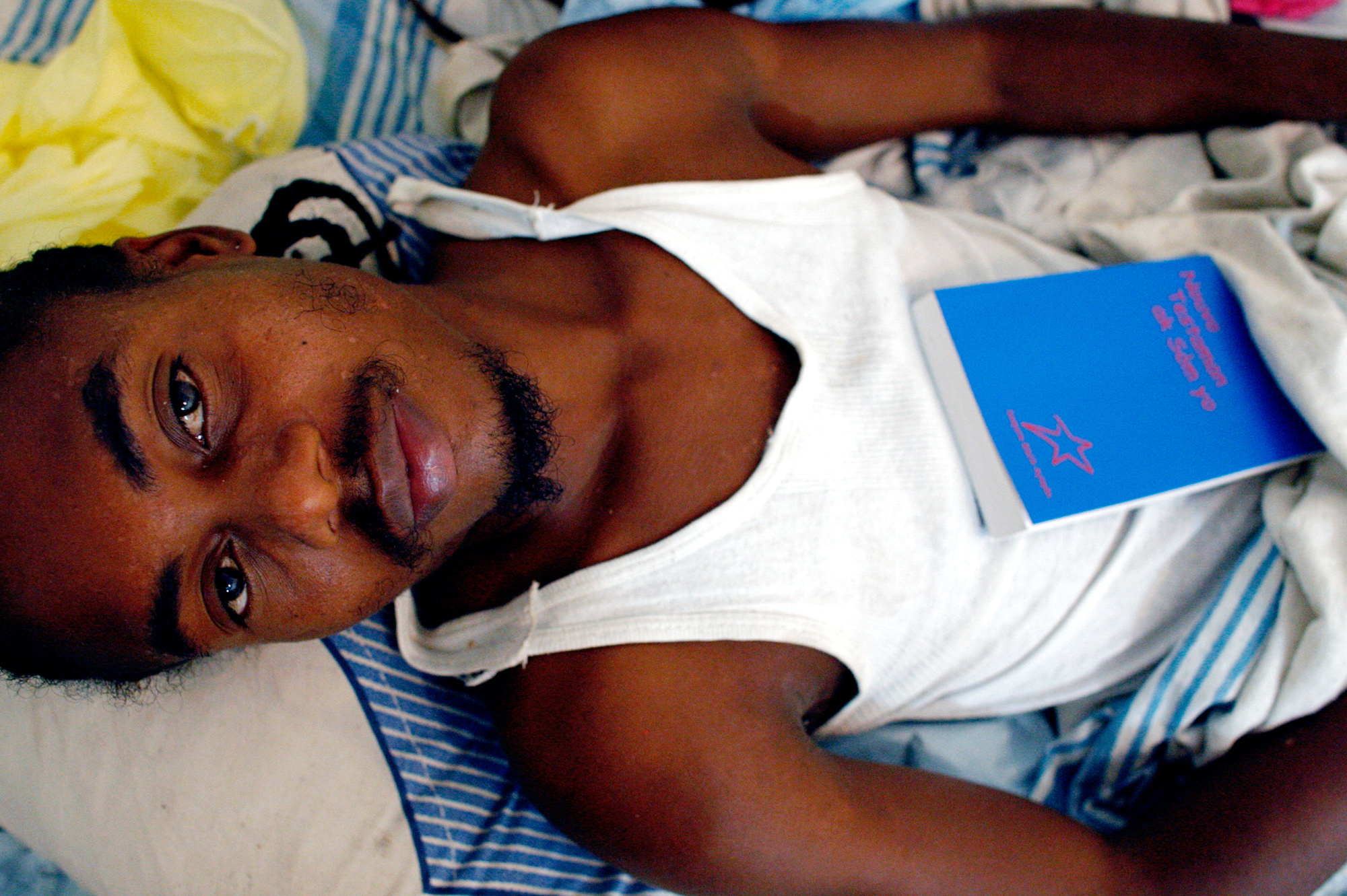
PORT-AU-PRINCE, Haiti (BP)–In certain places on the northern outskirts of Port-au-Prince, cars are stuck in traffic jams, street vendors are selling vegetables and people are filling restaurants. Despite these pockets of activity on the outskirts, the effects of the earthquake that claimed more than 150,000 Haitian lives two weeks ago continue to echo loudly throughout the city and surrounding areas.
In hospitals, volunteers offer medical care for broken bones and missionaries deliver supplies to help rebuild broken lives. But the catastrophe also has broken apart countless families.
Enso Jean Louis is alone in L’Hopital de Fermathe. He was brought there nearly two weeks after the quake. But unlike many of his fellow patients, the 22-year-old wasn’t accompanied by any family.
With bolts protruding from both sides of his injured right leg, he lies on a bed in a far corner of the ward. The bolts are attached to a brace that holds his bone in place. Filled with the noise of scrubs-clad medics rushing to treat the injured, the room is overflowing with patients and visiting family members. But there is no one at Enso’s bedside.
“My parents were taking care of us,” he says in Haitian Creole. “I relied on them. I do not know what can be done now.”
When the earthquake hit, Enso and his sister were watching television on the second story of his family’s house. His parents were downstairs with his other five siblings. Enso was knocked into the yard, where a block of concrete fell on his leg. The second story of the house collapsed onto the first, taking the lives of those downstairs.
The sister who was with him upstairs survived, but the two were soon separated when Enso was taken for medical care.
“I do not know where she is,” he says. “Today is 15 days without seeing [anyone I know]. I feel that I am alone. There are no people coming here. They are not looking for me.”
But Enso, who is a believer, clings to his faith. As he stares at the ceiling through hazy eyes, his fingers wrap tighter around a blue Creole-language New Testament.
IN THE DOMINICAN REPUBLIC
In Barahona, Dominican Republic, a farmhouse on the outskirts of town has been converted into a patient-care ward.
Inside, makeshift beds line the walls of what was once the living room. There is no volunteer medical staff, only caregivers who keep vigil in plastic chairs beside their patients.
Behind a wall of curtains dividing the room, 22-year-old Johnny Francois sits at the foot of his sister’s bed. Dieula has a row of stitches on her left side that stretch from her thigh to her ribs. Johnny has a small bandage around his right foot. While his sister sleeps, he gazes listlessly at the floor.
Johnny is the oldest of 12 siblings. When Dieula was sent to the Dominican Republic for medical care, Johnny went along to look after her. He has not seen his other family members since. All he can do is stay with his sister and wait. He passes each day, a healthy man in a room full of injured people, hoping for some sign their situation will soon change.
“My father — I don’t know where is him,” he says in broken English. “I don’t know this country.”
He looks around the room where he has spent the past two weeks and shakes his head.
“I have no person come to see me. No person come to help me,” he says. “I do not have a friend.”
The quake separated loved ones as some were trapped under rubble and others were rushed away for medical care. The situation was made worse when hundreds of unidentified bodies were buried in mass graves. Haitians may search for loved ones for months to come, wondering who might still be alive.
But for now, many feel the added ache of loneliness — a pain sometimes not immediately visible to volunteers or treatable by doctors. They long for a listening ear, an encouraging smile and a friend with whom to share hope.
–30–
Tristan Taylor is a writer for the International Mission Board in the Americas.
Southern Baptists can contribute to “Haiti Earthquake Disaster Relief” through their local church or directly to their state convention, the North American Mission Board (www.namb.net) or the International Mission Board (www.imb.org):
— The North American Mission Board has set up a Haiti disaster relief fund that will direct money to state conventions and other Southern Baptists who are doing relief work in Haiti. Donations may be made online, www.NAMB.net, by phone, 1-866-407-6262, or by mail, North American Mission Board, P.O. Box 116543, Atlanta, GA 30368-6543. Make checks payable to “Haiti Disaster Relief Fund/NAMB.”
— Initial funding for the relief effort will come from the International Mission Board’s disaster relief fund. Contributions can be made online, www.imb.org, or by mail, International Mission Board, P.O. Box 6767, Richmond, VA 23230.
Regardless of the SBC channel, all funds received for this purpose will go to relief efforts; none will be used for administrative costs.















